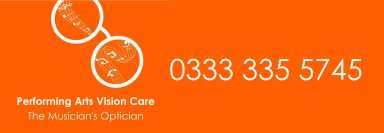




Performer-Specific Vision Solutions—Musicians, Actors, and Backstage Pros
Everyone has unique challanges
Every performer’s role on stage comes with its own set of visual challenges. At Performing Arts Vision Care, we’ve seen firsthand how musicians, actors, and backstage professionals each face unique obstacles under demanding stage lighting—especially as they age, and particularly when cataracts are involved.
Musicians: Clarity Amid the Lights
For musicians, clear vision is essential for reading sheet music, watching conductors, and staying in sync with the ensemble. Stage lighting can create harsh reflections and glare on music stands,
making it difficult to read notes—an issue that’s only intensified by cataracts, which scatter light and produce halos and starbursts around bright spots.
How we help:
Custom filters and tints tailored to the lighting conditions of
performance venues.
Prism corrections to maintain comfortable vision during long rehearsals.
Specialist anti-glare coatings to minimize reflections and glare, even for those with early or developing cataracts.
Actors: Seeing Cues, Not Just Lines
Actors rely on sharp vision to catch subtle cues, read scripts, and interact with other performers—all while under shifting, high-intensity lights. Cataracts can make transitions between dark and bright scenes especially disorienting, increasing the risk of missed cues or on-stage mistakes.
How we help:
- Precision colorimetry to reduce visual stress and filter out the most troublesome wavelengths.
- Bespoke lens solutions that adapt to both script reading and stage movement.
- On-site assessments in rehearsal spaces to ensure real-world effectiveness, even as cataracts progress.
Backstage Professionals: Managing the Details
Stage managers, lighting technicians, and production staff often juggle multiple visual tasks at once—monitoring control boards, scripts, and the stage action—frequently in low or rapidly changing light. Cataracts can make it harder to adapt to these shifts, increasing fatigue and the chance of error.
How we help:
- Advanced saccadic eye tracking to assess how lighting changes impact visual comfort and performance.
- Custom lens solutions for multi-distance tasks, reducing fatigue and improving accuracy.
- Specialist coatings to cut down on glare from monitors and stage lights, critical for anyone with clouded lenses.
Real-World Results
We’ve supported performers who thought vision loss and glare would end their careers. With the right combination of technology and expertise,
many have not only returned to the stage but found new confidence in their vision—despite cataracts or other age-related changes.
Click the link below to access practical, expert tips for adapting to stage lighting with ageing eyes, including strategies for self-care and communicating your needs with lighting designers.
e
©Copyright. All rights reserved.
We need your consent to load the translations
We use a third-party service to translate the website content that may collect data about your activity. Please review the details in the privacy policy and accept the service to view the translations.
